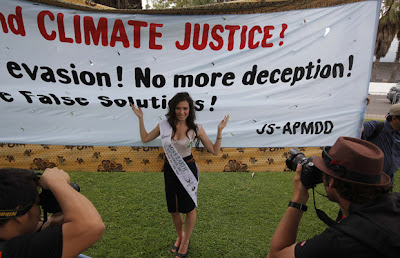Miss Water South Africa Kirsten Dukes poses in
front of a banner during a protest by environmental activists outside the United
Nations Framework Convention on Climate Change Conference of the Parties meeting
(COP17) in Durban
The president of one of the world's biggest scientific organizations
says the research community is being outgunned by naysayers.
She
said she is "scared to death" by trends that show declining public
acceptance of global warming and the growing influence of science
skeptics, who have plenty of resources to spread their misinformation.
"They
are actually being effective," Nina Federoff, president of the American
Association for the Advancement of Science, said Thursday when asked
about reports of a new push to undermine the teaching of global warming
in U.S. schools.
Documents leaked by a Canadian group this
week, said to be from the Chicago-based Heartland Institute, outline
plans to discredit climate change in public schools and cast doubt on
the scientific findings that emissions from burning fossil fuels
threaten the planet.
The Heartland Institute, which is
known for its attacks on climate science, responded to the leak with a
statement saying the documents were "stolen" and that at least one was a
"fake." The Canadian-based DeSmogBlog, which has long opposed climate
skeptics, posted the documents online Tuesday.
Federoff
said the Heartland Institute's "purported" plan to step up efforts to
discredit climate science highlights the need for scientists to become
better at communicating and engaging the public — one of the themes of
this weekend's AAAS annual meeting in Vancouver that is expected to
attract close to 8,000 delegates. There are also plenty of events
designed to draw in the public.
"I am very worried,"
Federoff told reporters. She noted that surveys indicate the number of
Americans who believe in climate change has been declining "even as the
scientific consensus (on climate change) has increased."
The
lack of public acceptance of climate change science "stalls what we
really need to be doing," she said, referring to the widely held
scientific view that greenhouse gases must be reduced to slow global
warming.
The resources available for "naysaying" are much
greater than the resources scientists have at their disposal to counter
misinformation, said Federoff, a geneticist and veteran of the heated
debates over genetically modified organisms.

No comments:
Post a Comment